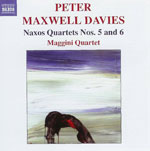Peter Maxwell Davies reaches the half-way point in his projected series of 12 string quartets commissioned by Naxos Records. There are two sides to Davies: the complex modernist ex-“angry young man” of British music, and the current Master of the Queen’s Music who composes works that have been known to please even Boston Pops audiences. His first six quartets neatly fall half in one camp, half in the other. (1, 2, & 6 are the harder-to-listen-to; 3, 4, & 5 are the more populist.) When Davies writes a lighter, more generally attractive piece, he nearly always attaches a reference in the title to the Scottish Islands where he makes his home–and sure enough, the Fifth Quartet is subtitled “Lighthouses of Orkney and Shetland”. Although there are radical musical processes in this quartet, the music is tonal and the listener can relate the sounds to the sweeping beams and the fog-horn calls of the lighthouses.
The Sixth Quartet is in the uncompromising style of the first two, though it’s a better work than either of those because it’s less self-conscious. In it, dark emotions are dealt with but not banished. I’m sure the Sixth is the most significant Naxos Quartet so far, but to my taste Davies goes wrong when he entrusts a major moment in the argument to the use of what is now a compositional cliché, a recitative for each instrument over chords sustained by the others. The Maggini Quartet plays with deep commitment and complete technical command. The recording is attractive and clear. But with the project half done, it seems ever less likely that the Naxos Quartets will be the 21st century’s answer to Bartók, Shostakovich, Britten, or even Rochberg.
































